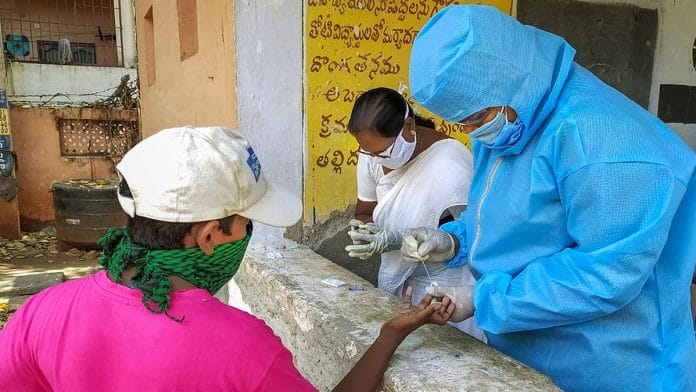New Delhi: Indian industry is keen to ramp up production of indigenous Covid-19 antibody testing kits but it has been struggling to get its hands on positive samples, a key input, from the government, ThePrint has learnt.
Controlled access to Covid-positive samples (blood/plasma/serum, or throat and nasal swabs) is crucial to the development, standardisation and batch-testing of diagnostic kits. Without them, companies can’t scale up production to commercialise their products even though the government has allowed them to do so.
Over the last two months, several diagnostic firms have approached multiple government departments — the think-tank Niti Aayog, the Indian Council of Medical Research (ICMR), and the Department of Pharmaceuticals (DoP) — but to no avail.
They have now finally filed a request with the Department of Biotechnology (DBT).
While Niti Aayog oversees Prime Minister Narendra Modi’s flagship “Make In India” programme, the ICMR and the DBT are key agencies with access to positive samples for research and testing purposes. The DoP is the primary body for addressing the grievances of medical device makers.
A senior government official acknowledged the industry’s grievance, but said the authorities were trying to find a way to address concerns about misuse or leaks before finalising a framework for sharing biospecimens with the private sector.
“Fearing the misuse or leakage of the samples, which could lead to spread of Covid-19 further, we haven’t yet released protocols for commercial sharing of biospecimens,” the official said.
“However, we are sharing samples for research and development usage at public institutions,” the official added, saying the guidelines for similar transactions with the private sector were being devised.
ThePrint reached the Niti Aayog, the DoP and the ICMR through emails and texts for an official comment but there was no response by the time of publishing.
The DBT, however, told ThePrint that the request will be processed soon. “Translational Health Science and Technology Institute (THSTI), an institute under the DBT, has set up a repository and they will be facilitating this,” DBT secretary Renu Swarup said.
Also Read: World’s most accurate antibody test has arrived. Or has it?
India is dependent on imported kits
Greater testing is believed to be one of the most important steps to check the spread of Covid-19 since a vaccine for the disease is yet to be devised.
Rapid antibody tests seek to detect Covid antibodies in a person to suggest possible infection.
They are home-based tests — much like pregnancy tests — and offer quick diagnosis that people can then take to health authorities for confirmation. As the world looks to do away with lockdowns to get the economy up and running again, and people learn to live with Covid-19, these tests can ease the burden on laboratories and help governments bolster testing, which, in turn, can keep transmission in control.
Currently, Covid-19 testing in India is largely dependent on imports. Of the 42 antibody tests validated for use in India, only around 10 are manufactured in the country.
However, experts say, even the Indian In Vitro Diagnostic (IVD) manufacturers validated by the ICMR’s National Institute of Virology (NIV) are struggling to scale up commercial production amid the non-availability of known positive and negative samples.
Much of the local production so far, they claim, has catered to batch-testing, for validation by the government, and not commercial purposes.
“There are companies that have the approval from National Institute of Virology (NIV) and the manufacturing licence from the apex regulator, the Central Drugs Standard Control Organisation (CDSCO). However, they do not have the confidence to commercialise their products,” said Veena Kohli, CEO of Vanguard Diagnostics, one of the companies that has been allowed to manufacture these kits.
“That’s because they do not have access to known positive and negative samples — the tool to ensure batch-to-batch consistency of results,” added Kohli, who also serves as the president of the Association of Diagnostics Manufacturers of India (ADMI).
Last month, the ADMI wrote to Niti Aayog and the DBT to resolve this issue at the earliest.
“It is a genuine concern and we are trying our level best to engage with the government,” said Manan Mittal, the technical head at Medsource Ozone, another Indian firm whose kit has been validated by the government.
Also Read: ICMR to fast-track WHO’s Solidarity trial roll-out in India, test 4 treatments for Covid
‘For a reliable Covid test’
On 4 May and 5 May, the Association of Indian Medical Devices Industry (AiMED), another organisation representing the industry, wrote to ICMR director general Dr Balram Bhargava and DoP secretary P.D. Vaghela, respectively.
“There was a recent notification in this regard but it is for full research and human ethical committee clearance and requires a tie-up with an institution,” the letters, accessed by ThePrint, state, referring to government guidelines on sharing biospecimen samples wit public institutions for R&D purposes.
“Our main issue is immediate access to positive covid serum samples to IVD manufacturers. Without this, no Indian company can produce a reliable covid rapid test. Pls (sic) take this up urgently with ICMR and Department of Health Research to enable Make in India,” the letters add.
Manufacturing firms have requested the government to notify a “nodal point of contact” with defined safeguards for collection, delivery and handling of samples.
Among other things, experts say, local players fear that continued lack of access may put them at a disadvantage against rivals who are able to procure “imported semi-finished” products by virtue of their joint ventures with foreign firms, most of which are Chinese and Korean.
Also Read: For dialysis & chemo patients, Covid test every week is a forced ‘rule’ at private hospitals






